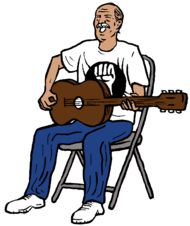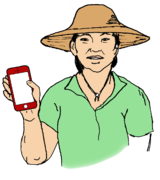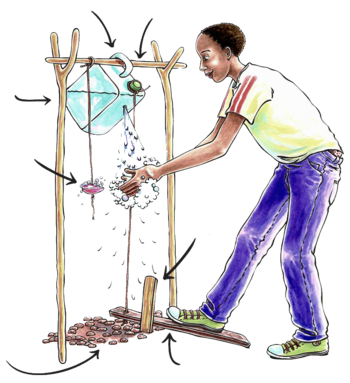Hesperian Health Guides
COVID-19: Staying well in the time of coronavirus
As with many illnesses, the healthier and stronger you are, the better your immune system works — the better you can fight off illness or recover if you get sick.
Contents
Strengthen your body against COVID-19 and other illnesses

- Eat healthy foods, including protein, especially oily fish, and fruits and vegetables. Eat foods that strengthen your immune system, such as garlic, ginger, and turmeric.
- For people with lighter skin, being outside in the sun for 15 minutes every day helps the body make Vitamin D, which helps fight illness. The darker your skin or the older you are, the more time in the sun you will need.
- Drink about 2 liters every day of water, teas, broth or other healthy drinks.
- Get enough sleep—7 or 8 hours.
- Wash hands often, especially before you prepare food or eat, and after going to the toilet.
- Exercise daily: take a walk, dance, do stretches, yoga, or tai chi, and do breathing exercises. Exercise that strengthens your heart and lungs—like climbing stairs or running—helps your body better fight lung infections. Another way to exercise your lungs, and raise your spirits, is to sing loudly.
- Do not drink alcohol, it weakens your immune system.
- Do not smoke or be around smoke. Smoke harms your lungs, where coronavirus attacks.

Strengthen your mental and emotional health to feel better
Staying at home and not interacting with people outside your household is important to fighting the epidemic, but can leave you feeling isolated, sad, or worried.
- Appreciate the good aspects of your life. Think of family or friends you love, the land that feeds you and nature around you, someone who has helped you, those you worship with, or anything else that makes you happy.
- If you feel down, talk with friends about how you feel on the phone or in person keeping 2 meters (6 feet) apart. But avoid large gatherings and crowded areas. Greet people with no touching or being too close.
- Make something—art or music, something to wear or to eat.
- Help other people, especially children, and those in difficult situations.


An epidemic affects everyone in a community. While each household must care for itself and try to stay safe, we cannot survive coronavirus without caring for each other. Work with others in your community so everyone:
- has enough to eat. Collect food to share. Grow food on unused land. Reach out to people to find out if they are in need.
- has access to clean water or ways to purify their water.
- can wash their hands in public areas. Make tippy taps, water and soap available.
- is safe. Children or adults facing neglect, abuse, or violence need help. Parents or adults who take their anger out on others need support.
- has someone to talk to. Visit people who live alone to speak with them, while keeping a safe distance apart.
- understands what COVID-19 is, how to prevent it, and how to care for those who become ill.

Pay attention to all health problems, not just COVID-19
While COVID-19 is an emergency, it should not mean that people do not get care for their other health needs. Contraceptives and other reproductive health services are still necessary, as is prenatal care during pregnancy. Counseling and medicines for chronic diseases, such as HIV, tuberculosis, diabetes and others cannot be interrupted without causing serious problems, including death. Children need immunizations, and malaria nets and medicines must be distributed where needed. These services can be provided differently, through telephone calls or text messages, and medicines and supplies can be delivered directly to the household to avoid travel to a central clinic.


